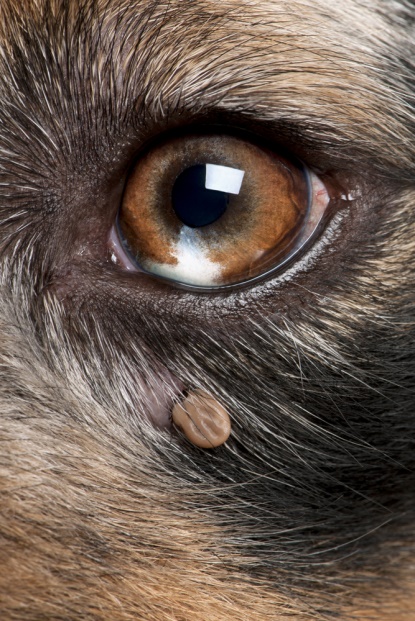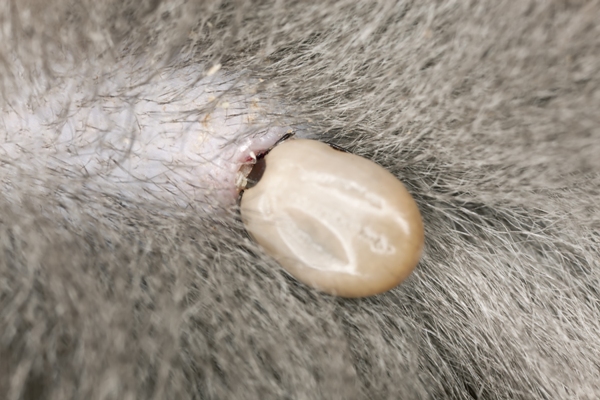It is officially tick season in Australia and with the weather warming up and occasional bouts of rain, the chance of your pet contracting a paralysis tick is very high. Here at McDowall Vets we have already seen several paralysis tick cases in the past few weeks.
Paralysis Ticks are native to Australia (mainly the east coast) and tend to travel around on marsupial hosts such as possums. These marsupials over time have built up immunity to the paralysing neurotoxin of these ticks. The ticks then drop off their hosts and are picked up by our pets while in the yard or out on their regular walks. The ticks then attach to the pet and feed on their blood, at the same time secreting a fatal neurotoxin.
Paralysis Ticks can engorge for 3-5 days before our pets show any symptoms.
The symptoms of tick paralysis include;
- Change in their voice
- Laboured breathing
- Gagging, Retching or Vomiting
- Coughing
- Trouble standing or walking, wobbly on their back legs
If your pet shows any of these symptoms, or if you find a tick on your pet, please call us immediately. Even if a tick is removed, the toxins could still be affecting your pet, so it is always best to get them to us as soon as possible (and remember to bring the removed tick with you so that we can identify it!)
 Once at the vet, a tick search will be performed to find and remove all ticks. If your pet has very long or thick fur, a shave may be necessary to confirm that all the ticks have been found. We will then give your pet an anti-tick serum to counteract the neurotoxins that the tick has secreted. Your pet will be monitored after the administration of the anti-serum to ensure no reactions occur. We will also check the function of the bladder to ensure that it is still operating correctly. In severe cases we will also use oxygen and intravenous fluids to help your pet. Depending on the severity of the case we may need to keep your pet hospitalised overnight or they may be required to go to an emergency vet for constant monitoring.
Once at the vet, a tick search will be performed to find and remove all ticks. If your pet has very long or thick fur, a shave may be necessary to confirm that all the ticks have been found. We will then give your pet an anti-tick serum to counteract the neurotoxins that the tick has secreted. Your pet will be monitored after the administration of the anti-serum to ensure no reactions occur. We will also check the function of the bladder to ensure that it is still operating correctly. In severe cases we will also use oxygen and intravenous fluids to help your pet. Depending on the severity of the case we may need to keep your pet hospitalised overnight or they may be required to go to an emergency vet for constant monitoring.
Tick paralysis is a very unpredictable disease with severe effects on the heart and respiratory muscles, and unfortunately not all animals survive, even with treatment.
Like anything, tick paralysis is easier to prevent than to treat. There are a few things you can do to reduce the likelihood of tick paralysis in your pet.
- Try to avoid bushy and grassy areas as ticks thrive there. Paralysis ticks are sneaky parasites that will wait in these areas until your pet passes through it and then seek them out as they are attracted to carbon dioxide.
- Carry out a daily tick search on your pets. Ticks like to hide in dark and warm places. Systematically work your way through your pets coat with your hands, feeling for unusual lumps, bumps or sores. Always check any folds in the neck and underneath their collar. Popular spots for ticks include, between the toes, in the ears, on the face, in the groin and underarm area and around the anus. Check your pets especially thoroughly if you have been walking out in the bush or if you have taken them camping for a few days. If you find one, don’t stop searching, if there is one, there could definitely be others.
- You will also need to use a tick prevention product. At McDowall Vets we highly recommend Nexgard Flea and Tick prevention for dogs. It is a chewable tablet given monthly. We also stock several other preventative treatments for dogs such as topical skin products, tick collars and baths.
Unfortunately tick prevention for cats is quite hard to come by. We currently stock Frontline Spray, which needs to be sprayed over your cat on a 3 weekly basis to prevent fleas and ticks. We are expecting a new spot on to be released in the next month that will protect against ticks in cats for three months, which will be a real game changer.
Head in to McDowall Vet Practice to pick up your next dose of tick prevention or give us a call if you have any questions!

